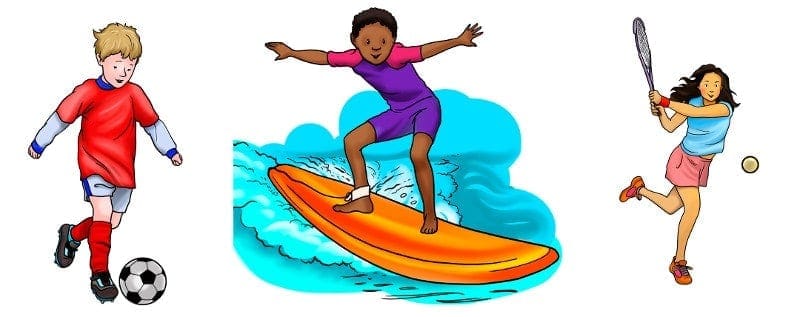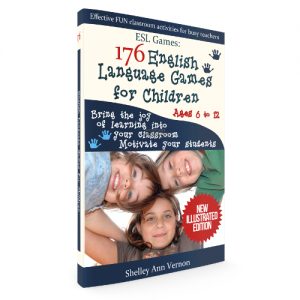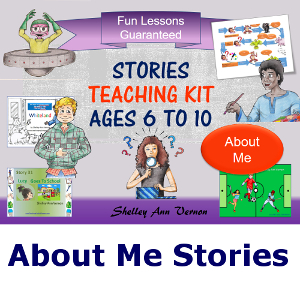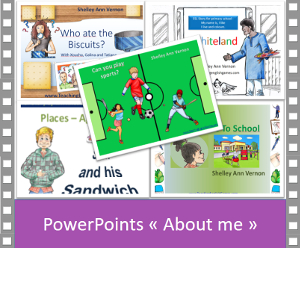Here is a lesson plan for sports and can you play, for a class of up to 30 primary school children. All the games are taken from ESL Games: 176 English Language Games for Children. You can get that from me in download and also in paperback from Amazon.
Tip before you start: With 30 children, it is best to be strict during game-playing to keep control of the class.
Introduce sports vocabulary
Play some listening games first to introduce the sports vocabulary.
Jump the Line
Draw a line down the middle of the board. Draw sports of your choice, relevant to your pupils either side of the line. For example, draw a tennis racket and a baseball bat on the left and a swimming pool and a football on the right. Stick on paper pictures if you prefer. Name a sport and tell the children to stick out either their left or right arm to indicate which side of the line the picture is.
Say the words slowly once each and have the children stick out either a left arm or a right arm. This is a check to make sure everyone has understood the game. Now start saying the words quite quickly but not so fast the children get lost. Gradually accelerate.
The fun is all in the pace and keeping pupils on their toes. If you say each word slowly, then wait until every child sticks out the correct arm, it will be totally boring. Those pupils who make some errors will still be hearing the words over and over again anyway. Make sure you call out words on the same side as well as alternating sides so the children never know which arm it will be.
Then add in two more words and play with 6 words. Repeat words you see children don’t know so well more often.
The whole game should take five to six minutes from start to finish and should be played in silence.
Show me
Spread sports flashcards around the room. Perhaps get the kids to help you, so ask 8 children to take a picture and stick it on a wall, so you have pictures all around the classroom.
Call out the sports pictures while pupils swivel around and point to the correct picture. Again, the fun is all in the pace of the game.
This is another silent game.
If you would like a complete lesson plan for sports, with flashcards and worksheets you can get one with this story set:
A Story for sports with complete lesson plan, flashcards, plus worksheets – in this teaching kit for primary school children, with 5 stories for “About Me.”
Speaking Games
Now you could try a variant of duck duck goose. Set up a four-beat rhythm with two of the sports words, such as tennis, tennis, golf. Golf is two beats, tennis is one beat. Have 5 potatoes or pieces of screwed-up paper passed around the class as the children chant the rhythm. Spread the potatoes evenly about the room. Here is a tip to ensure everyone has a turn: Tell the children the route they must pass the potatoes, for example, up and down the rows or from side to side. After thirty seconds of chanting, say stop on “golf”. All the children holding a potato stand up and do a forfeit. This can be anything, such as naming a random vocabulary flashcard, doing a dance or doing 10 star jumps.
You could put the children in two teams. Then, whenever a child doing a forfeit names the vocabulary, give a point to their team. Then set up the rhythm again but this time with two different sports words, such as football, football, swimming. Once the rhythm is going, tell the children to pass the potatoes. Once again, stop unpredictably and repeat the forfeits for whoever is holding the potatoes. Repeat this game until the class have learned all the vocabulary.
To keep good discipline you can deduct a point from the team if a team member is misbehaving.
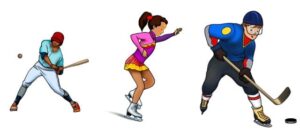
Teach “I play tennis”.
The children will have a good grasp of the sports vocabulary by now, so you can start to use some sentences such as, “Can you play tennis?” Or, “I play tennis.”
Relay Race is a simple game to practise saying short sentences. I suggest you make teams. It’s easier to use the existing configuration of your class. So, if you have five rows of six children, have five teams of six. Each team will pass the relay from front to back or vice versa.
I suggest that you pass down sentences such as “I can play tennis, I can play football, I can play golf.” Give each team a different picture flashcard to pass down. The first person holds their flashcard of a sport. When you say, “go” pupils pass the card to the person behind them saying, “I can play tennis.” This person takes the card and passes it to the one behind them saying, “I can play tennis.” Pupils keep going until the picture card reaches the end. At that point, the child at the end brings the card to the front. Even though it’s a race, it’s best to request walking only and watch out for bags and things in the aisles that can be tripped over.
Some movement is good in class, but not too much with thirty children. See ESL Games: 176 English Language Games for Children for more ideas.
Teach the question “Can you play?”
Colour Wolf – listening to the question form “Can you play tennis?” Give out 29 pictures of sports – if you are teaching 8 new words then you would have between 3 and 4 copies of the same picture. If you do not have any flashcards then ask the children to do one picture of a sport of their choice. Make sure the children do not all draw the football!
Now each child has a picture, ask the whole class to stand up. You ask, “Can you play tennis?” All the children holding a picture of tennis must sit down. To prevent cheating, have the children show their pictures. Continue asking your questions as you go through all the sports until you read the last sport – all those left standing are winners.
Have the children swap pictures and play again or move on to something else. Ideally, pick out one of the winners to come up and ask the questions for round two.
Writing games
Hangman
Now you could show your children how the words are written by playing hangman for a few minutes. Hopefully, you will get through all 8 new words in about 5-8 minutes. You do not want to play for longer than that. Tell the children that they must write down the correct spelling of each word during the game in their vocabulary notebooks – or wherever.
Boggle
Now the children will have seen the words written and will have copied them down. So you could play Boggle.
Here is an example of a grid with sports including tennis, football, swimming, golf, hockey, bowls and sailing. Note that to make a word you can only use a letter once, so to make ‘running,’ you would need three Ns in the grid – and there are only two.
For fun, you could give out bonus points for any other words that the children come up with in addition to the 8 sporting words. There are masses of them! Just glancing at the grid I can see the words: now, run, gun, man, ran, rat, mat, wet, met, yellow, hello and these less obvious words, slim, tan, mug, cello, bin, ban, coal, mole, whole, goal, toll, bowl, age, etc. etc. This is just an extra to see what the children come up with. Obviously, they have limited vocabulary and will not find all the words, and the purpose is not to spend time writing out a list of words either, but just to give the quicker children an extra challenge.
Consolidate and Revise
Brainstorm
I suggest that you use sports vocabulary and do a few rounds with some other themes as revision.
Other ideas for games would be True or False Questions, and a word flashcard race, Abracadanagram A, B and C and Anagrams. (All in 176 English Language Games for Children, please see below for links.
Resources for a lesson plan for sports
1. A Story for sports with full lesson plan and flashcards, plus worksheets – in this teaching kit for primary school children, with 5 stories for About Me.
2. Games book for the classroom to drill and practise vocabulary and grammar. ( PAPERBACK or DOWNLOAD)
-
Sale Product on sale
 ESL Games book for primary & middle school children
ESL Games book for primary & middle school children€19.97Original price was: €19.97.€15.33Current price is: €15.33.Rated 5.00 out of 5 based on 2 customer ratings -
Sale Product on sale
 About Me Stories Teaching Kit + PowerPoints
About Me Stories Teaching Kit + PowerPoints€49.97Original price was: €49.97.€33.97Current price is: €33.97. -
Sale Product on sale
 About Me PowerPoints
About Me PowerPoints€19.97Original price was: €19.97.€9.97Current price is: €9.97.
